Infotester4Education Short Term Training, 03rd – 07th June 2024
Tampere University of Applied Sciences, Tampere
Event Title: Development and implementation of AI education methods and digital tools supporting tackling disinformation and course formulation.
Coverage: Integrated methodology, practicalities, and education on the application of tackling disinformation.
Participants: Science4People (coordinating organization), Veliko Turnovo University ST Cyril and Methodius, Polsko Japonska Akademia Technik Komputerowych Pjwstk, Anoikto Panepistimio Kyprou (Open University of Cyprus), Tampere University of Applied Sciences (host organization)
Objectives:
1) The theory and practice of how to combat and verify the credibility of disinformation and how to develop education about it.
2) The basics of detecting and countering disinformation (methodology and practicalities)
3) Educational course design
4) Starting to develop the course structure based on interviews (students, teachers, experts) and organizational needs
5) Finding common examples of tackling disinformation in the participants’ contexts.
June 3, 2024
On the 3rd of June, the INFOTESTER4EDUCATION project consortium presented WP2 – results of international in-depth interviews conducted by VTU as a basis for the development of a course supporting the development of a methodology to combat disinformation.
The analysis of the interviews was presented by VTU and gave great insights into the needs (of students, teachers, and experts) for the development of disinformation detection education, the desired tools and the development of current methods used for this purpose. Based on the data and its analysis, the consortium started structuring the new course – starting with the vision of its learning objectives and topics.
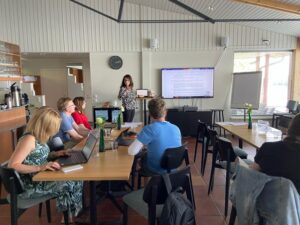
Illustration: Presentation of results and analysis of in-depth interviews for course development in the INFOTESTER4EDUCATION project. (Varala, Takkahuone B, Tampere, Finland – Photo: Eeva Heikkilä)
June 4, 2024
On 4 June, the INFOTESTER4EDUCATION training continued with an introduction to the methodology of verifying the credibility of information, led by PJAIT. The training (hybrid: online and presence) was attended by international HEI students from each institute, who actively participated in the exercise together with teachers and experts. The main content of the training day was the theory and practice of how to tackle and verify the credibility of disinformation. It also focused on how to identify and combat disinformation (methodology and practice).
The results of the interviews presented the day before highlighted the need to develop methodology, tools, and training to increase awareness, skills and credibility for the process of verifying the credibility of information. In training, the focus was adjusted to the identified needs, developing an understanding of disinformation – definitions, recognition, and disarming, and adding steps for practical exercises through inoculation – Bad News Game, Go Viral. At the end of the day, the consortium set up a work plan, a breakdown of topics and milestones, led by S4P.
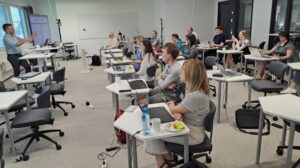
Illustration: Training on the introduction of the methodology for verifying the credibility of information in the INFOTESTER4EDUCATION project. (TAMK, Tampere, Finland – Photo: Eeva Heikkilä)
June 5, 2024
On the 5th of June, the training day focused on deepening the understanding of the methodology – platform and application, led by PJAIT. Later in the afternoon, learners started to work on the platform – practical task and its analysis – ending with discussion and conclusions.
In the workshop, learners familiarized themselves with articles on pre-selected topics and, using the platform practised how to detect and analyze information in order to teach the platform’s algorithms to detect and classify reliable and disinformation. The training was eye-opening and engaging for the learners, making the learning experience meaningful and positive (see positive testimonials below).
“I improved my theoretical and practical knowledge about disinformation.”
“Great management of time, explaining of the objectives, very interesting training.”
“It is good that the first day is more theoretical and the second day is more practical.”
“I’m extremely grateful to have participated in this training. It was very interesting, as I have encountered such problems in my daily life. I hope there are more such useful trainings.”
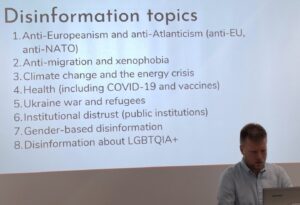
Illustration: Introduction of topics for verifying the credibility of information in short-term training of the INFOTESTER4EDUCATION project. (TAMK, Tampere, Finland – Photo: Pertti Näränen)
June 6, 2024
On 6 June 2024, the short training meeting focused on the connection between a methodology and a course design. The meeting focused on the introduction of a course structure on how to verify the credibility of information, led by PJAIT and VTU, followed by the integration of the Disinformation Detection Service for AI-Supported Education into the course, led by S4P.
At the end of the meeting day, there was a discussion on how to design an intensive programme for higher education students/staff based on the outcome of the meeting, led by OUC, and what to expect from the dissemination activities and their timelines, led by TAMK.
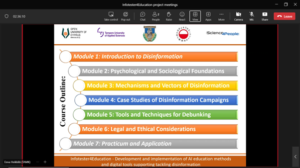
Illustration: Presentation of a structure of a course on how to verify the credibility of information from the INFOTESTER4EDUCATION project. (TAMK, Tampere Finland – Photo: Screenshot of the presentation)
June 7, 2024
On 7 June 2024, the last day of the short-term training, the results of the week, further steps (work to be done), milestones, responsibilities (division of work) and schedules (deadlines) were summarized under the leadership of S4P.
The most important steps for the future are to finalize the structuring of the course on how to verify the credibility of information and its chapters, to use a methodology for verifying the credibility of information, to ensure support for the local teams in their work, to focus on indicators and deadlines. In addition to these activities, the consortium members are developing dissemination activity plans to be introduced and linked to the project template and reporting system in the September meeting.
At the end of the productive training week, the participants took a farewell project team photo.
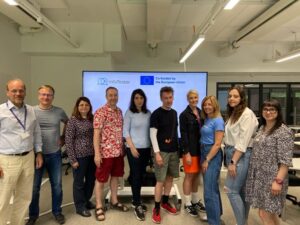
Illustration: Project partners in a group photo after the short training of the INFOTESTER4EDUCATION project. (TAMK, Tampere, Finland – Photo: n.n.)

Infotester4Education kick-off, 17th – 18th April 2024
Polish-Japanese Academy of Information Technology, Warsaw
On the 17th of April, the Polish-Japanese Academy of Information Technology hosted the leader of the consortium – Science4People organisation – together with representatives of partner universities: University of Veliko Tarnovo, Bulgaria, Open University of Cyprus, Tampere University of Applied Sciences, Finland.
The Infotester4Education project aims to address the growing problem of disinformation in the digital age, focusing on its impact on democratic values and academia.
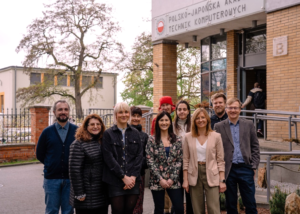 The meeting started with an ice-breaking activity that warmed everyone up to action. Next, the goals, vision statement of this project and the individual work packages along with the schedule and milestones were discussed.
The meeting started with an ice-breaking activity that warmed everyone up to action. Next, the goals, vision statement of this project and the individual work packages along with the schedule and milestones were discussed.

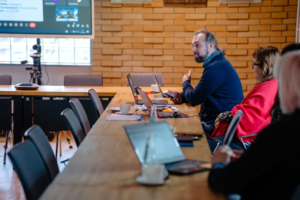
After an intense day of group work, the team took a refreshing walk around the Old Town and went to an integration dinner.
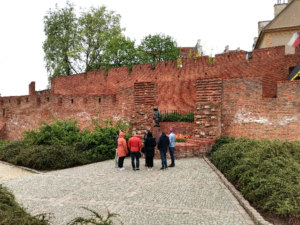
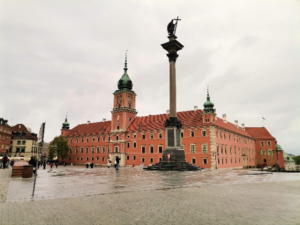
On the second day, members of the Infotester4Education team agreed on the methodology of operation and key details of the project. The list of topics selected for disinformation analysis was presented and then discussed.
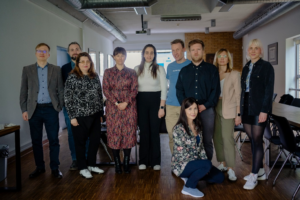
The project kick-off was a productive session that brought many brainstorming ideas on implementing this initiative. The next stage will be training in Tampere, Finland, on how to successfully detect and combat disinformation.
Project title: Development and implementation of AI education methods and digital tools supporting tackling disinformation
Project number: 2023-2-PL01-KA220-HED-000180856
The leader of the consortium: Science4People (S4P) spółka z ograniczoną odpowiedzialnością
Partners of the project:
Veliko Tarnovo University (VTU) – Bulgaria,
Open University of Cyprus (OUC) – Cyprus,
Tampere University of Applied Sciences (TAMK) – Finland,
Polish-Japanese Academy of Information Technology (PJAIT) – Poland
The project period: 01/04/2024 – 31/03/2027
The total budget: 400.000,00 euro
The source of funding: Cooperation Partnership for Higher Education, ERASMUS+, Foundation for the Development of the Education System, Poland

